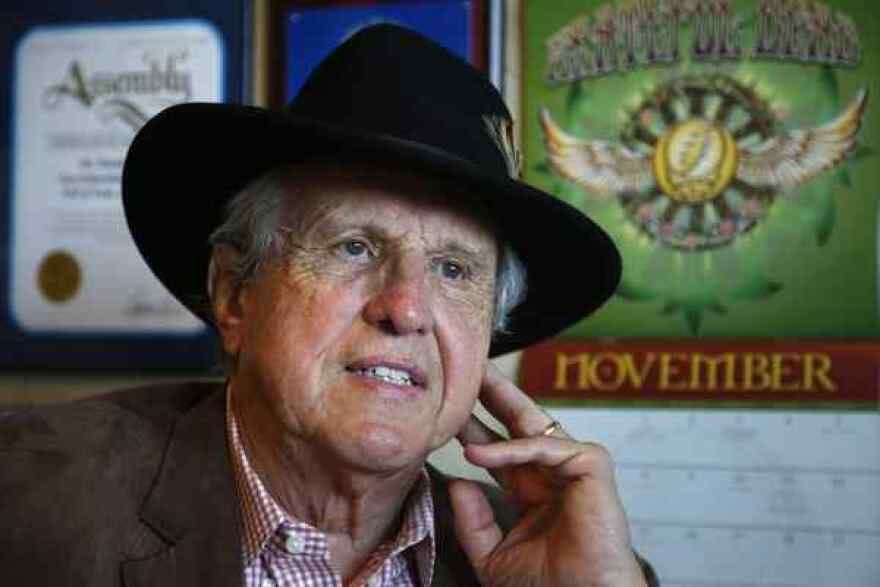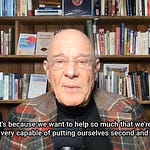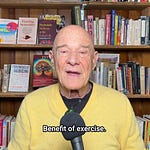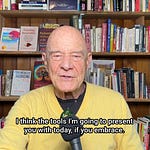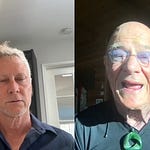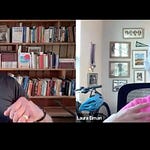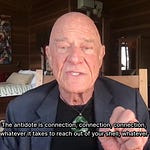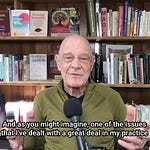Dear listener,
I'm excited to share my recent interview with Dr. David Smith, founder of the Haight Ashbury Free Clinic and a renowned leader in the field of addiction medicine.
Dr. David Smith is a nationally recognized leader in the treatment of substance abuse and dependency. He is the founder of the Haight Ashbury Free Clinics of San Francisco and has held the position of Medical Director for nearly 40 years. Dr. Smith is the founder and publisher of the Journal of Psychoactive Drugs and has authored or co-authored 26 books, written over 340 journal articles, and edited 28 journals. He has served as Principal Investigator for numerous research grants and has been actively involved in health care reform and the acceptance of addiction medicine as a recognized specialty.
In this episode, Dr. Smith chronicles the dangers of recreational use of psychedelics and emphasizes the importance of education and proper guidance in ensuring safety. He explores the three dimensions of psychedelic use - recreational, medicinal, and spiritual - and highlights the need for responsible and informed consumption.
Smith traces the history of psychedelics from the 1960s to the present, and discusses their potential therapeutic benefits, cautioning against the misuse and indiscriminate use of these substances. He also challenges the notion that psychedelics directly lead to addiction, emphasizing the influence of other factors such as predatory drug dealers. He shares his insights on the therapeutic potential of psychedelics and the importance of understanding set and setting in psychedelic experiences.
Golden Light,
Dr. Richard L. Miller
P.S. In the holiday spirit, I am discounting paid subscriptions by 20% until the end of the year. Subscribers get access to full transcripts. I am publishing this week’s transcript as a preview into the perks of being a member of our program. Please consider supporting us.
Mentioned in this Episode…
Listen to learn…
How can education and proper guidance ensure the safe use of psychedelics?
What are the three dimensions of psychedelic use?
What are the risks and benefits of recreational, medicinal, and spiritual use of psychedelics?
How can set and setting influence the outcomes of psychedelic experiences?
How does understanding trauma and the default mode neural network contribute to safer psychedelic use?
What factors contribute to the misuse and abuse of psychedelics?
How can responsible and informed consumption of psychedelics be promoted?
What are the therapeutic potential and limitations of psychedelics in addiction treatment?
Quotes…
"I want them viewed as a medicine with side effects." - David Smith MD (00:45:01)
"I don't believe that you should criminalize addiction or criminalize drug use. It hasn't worked." - David Smith MD (00:46:40)
"I experienced that ground between life and death, afterlife. And that when you die, it's not just you go from life to death, you go into this third dimension, this spiritual dimension." - David Smith MD (00:48:20)
"I don't want the recreational use to backfire and kill the therapeutic and ceremonial spiritual use like it did in the sixties." - David Smith MD (00:50:39)
Seeking Psychedelic Testimonials: The Good, the Bad, and the Ugly.
We are currently looking for first-hand accounts of adverse effects of psychedelics—from ‘bad trips,’ to unwanted physiological complications, to abusive practices by guides, therapists, and shamans.
The interviews from this series will go into a forthcoming book on the topic—perhaps the first book its kind.
Please contact me if you would like to be interviewed. You can also leave us a voice message to share your story. We will keep your information anonymous unless you tell us otherwise.
My Books
Freeing Sexuality: Psychologists, Consent Teachers, Polyamory Experts, and Sex Workers Speak Out
Psychedelic Wisdom: The Astonishing Rewards of Mind-Altering Substances
Psychedelic Medicine: The Healing Powers of LSD, MDMA, Psilocybin, and Ayahuasca
Integral Psychedelic Therapy (co-edited with Jason A. Butler & Genesee Herzberg)
NOTE: The podcast is always freely available thanks to our paid subscribers. Please share this post to show your support for transparency. The following transcript distills the key points from this show into a condensed form. It is meant as a reference - listen to the full episode for an accurate rendition of the conversation.
Transcript
00:00 - David Smith's Background and Expertise
Richard Louis Miller: Welcome to MindBody Health and Politics. I'm your host, Dr. Richard Louis Miller. Today we're going to have with us one of the most famous doctors in the United States, my colleague, Dr. David Smith, of the Haight-Ashbury Medical Clinic, and a leader in the treatment of chemical dependence in this country and around the world.
David, it's a pleasure to have you here.
David Smith MD: Thank you, Richard. Always enjoy talking to you.
Dr. Richard Louis Miller: David, one of the topics I want to talk to you about is the subject of one of my forthcoming books, which is the adverse effects of psychedelics. I know you've been discussing this topic, and you've had concerns, for example, about the bill that Governor Newsom recently vetoed to decriminalize certain psychedelic substances.
Please share your thoughts on what your concerns are and your overall course of action to protect the American public.
David Smith MD: Thank you, Richard.
It's a complicated question. I've prepared for it, knowing you ask provocative questions, and I've reviewed my recent writings. The most relevant article I published in San Francisco Medicine is titled "Psychedelics and Medicine: Déjà Vu All Over Again."
I began my career studying psychedelics in the laboratory. This was the era, as you know from your writings, in which drugs like LSD were used for therapeutic purposes. I was very interested in that, and there were top clinicians and scientists studying its use for treating alcoholism and other disorders, so there was tremendous therapeutic potential. I lived in the Haight-Ashbury because I attended UCSF Med School.
Then, suddenly, the counterculture exploded, and large numbers of people started taking LSD for non-medical reasons. I don't want to downplay that because a lot of interesting things resulted, like psychedelic music, psychedelic sound, and the art forms. However, there were many adverse reactions because it was done in an uncontrolled manner in terms of set and setting. That's when we started the Haight-Ashbury Free Clinics. At that time, Richard, addiction was treated as a crime. Doctors who treated addiction were considered as aiding and abetting a felony. Treating these people, you ran afoul of law enforcement.
So, we had all these young people in the Haight-Ashbury. The police said, if you're crazy enough to work there, you can, but we're going to wall it off. We had undercover agents come in, and then we saw the shift to speed and heroin, which just killed everything. That was when I essentially initiated the field of addiction medicine as a medical specialty.
Now, the theory was that these psychedelics led to more serious addiction problems. I don't really believe that. I think there were other forces. You've talked about predators, like drug dealers, seeing a susceptible population. That's when Charlie Manson came in, along with the drug and speed dealers. But if you see a susceptible population, particularly those with mental health problems as a result of psychedelics, and introduce toxic, potent drugs, you're going to see an escalation of addiction.
So that was that era. The field of addiction medicine escalated. The drug problem is much worse now than ever. There are three overdose deaths a day in San Francisco. We call them 'frequent flyers.' The ERs are filling up with individuals who have drug-induced overdoses and medical problems. It's very serious.
That's what we call the second psychedelic revolution. The third is what's happening now. These chemicals, as you know, Richard, have no moral characteristics. It's about how they're used, the set and setting. In your writings, you've talked about that. But the issues we see with a certain number of young people are concerning. They don't think about the consequences, they don't read, they don't prepare.
This latest issue related to Governor Newsom's bill came as a result of an incident with an attorney, Beth, whose niece took psilocybin and jumped off the Golden Gate Bridge, recording her suicide thoughts beforehand. We've had three or four similar cases.
When you analyze these deaths, it's not as if the individuals go see a therapist, prepare, or consider set and setting. They just think, "Well, let's go take some psychedelics I read about," and then bad things happen. In my research and recent articles, such as "The Future of Psychedelic Medicine" for Addiction Medicine ASAM Weekly, and my work at UCSF's Psilocybin Research Center, where controlled studies are conducted, I've explored this topic deeply. Additionally, I'm involved in a group called Psychedelics in Recovery. Being in 12-step recovery myself, I've used psychedelics to address comorbid PTSD from athletic injuries. Despite it being a Schedule I substance, we're exploring how psychedelics can enhance spiritual recovery. There are about 17 groups like ours, and we're also examining the ceremonial use by indigenous cultures in the Bay Area.
I founded the Journal of Psychoactive Drugs and the Journal of Psychedelic Drugs, which is now based out of UCSF. Joe Girish is the editor. The latest issue features studies from countries like Peru, Mexico, and Uruguay on the ceremonial use of psychedelics. In fact, some of our group members attend Ayahuasca ceremonies in Peru. So, Richard, there are different aspects to consider: misuse and abuse, therapeutic use, and ceremonial use. They involve the same chemicals but result in very different outcomes.
Now, regarding your specific question about adverse reactions, our understanding of the brain has been instrumental. For instance, the thinking part of the brain, the prefrontal cortex, which is responsible for logic and reason, overlays the subcortical subconscious. Trauma can deeply affect this system, burying itself in what's known as the trauma cone within the cingulate gyrus. It becomes walled off. There's a modulating area called the default mode neural network. When this network is hyperactive, it's typically ego-driven, which is crucial in certain situations, like facing a saber-toothed tiger or preparing for an interview. But for achieving serenity, a decrease in the default mode neural network activity is necessary, achievable through meditation, yoga, and other techniques you've described.
Classic psychedelics, being 5-HT2A receptor agonists, activate a specific receptor in the serotonin system, decreasing activity in the default mode network. This process can open the trauma cone, releasing various suppressed emotions and experiences. In a therapeutic setting, this release can be beneficial. However, for a young, unprepared person, it's like opening a 'garbage mind,' unleashing all the suppressed content without knowing how to handle it, leading to what is known as a bad trip. The intention behind taking a potent psychedelic matters, but the outcome can be vastly different.
To personalize this, I once took LSD, which led to a spiritual experience so profound that it changed my career path and inspired me to start a network of clinics. More recently, after a severe athletic injury that resulted in a fractured rib and punctured lung, I experienced PTSD. I used psilocybin, aiming to address the PTSD, and took a 'heroic dose' since I prefer macrodosing over microdosing.
The experience was transformative. I was prepared to take five grams, but found myself journeying through the universe, unable to make decisions. During this experience, I communicated with my deceased parents, interacted with my grandparents, and had numerous visions. This journey not only served its intended purpose but took me far beyond what I had anticipated.
15:59 - Adverse Effects of Psychedelics
Dr. Richard Miller: And did you take it recently, in the last few years? You're in your 80s now, right? Did you have any concerns about increased blood pressure and heart rate when taking it?
David Smith, MD: Yes, I did have concerns. I thoroughly reviewed the literature on blood pressure and pulse rate, considering the medical aspects, especially being a senior. Fortunately, none of those issues occurred.
Dr. Richard Miller: I want to share that I'm the same age as you. I'll be 85 in March. Nowadays, when I take a psychedelic, I also take a little propranolol or atenolol with it to modulate my blood pressure, just to be on the safe side.
David Smith, MD: I agree with that approach. But it's important to note you're an experienced, knowledgeable person. When you do it, you have to consider all the factors like age and any comorbid medical problems. I spent a lot of time preparing with my guide, going to a safe, spiritual place, similar to where I first took LSD. My intention was to replicate my LSD experience: walking down to Lake Tahoe, talking to the trees and the leaves, and immersing myself in nature. However, I couldn't...
Dr. Richard Miller: You also had the intention of dealing with the PTSD from your accident, right?
David Smith, MD: Absolutely, intentionality is crucial. You need to understand why you're doing it. I can say that I had to have assistants to go to the bathroom. The only being I communicated with was the dog lying on my chest. This little dog knows all my secrets. It's essential to have intentionality, set, and setting.
Dr. Richard Miller: Let's put this in context, David. Of the three modalities you discussed earlier - recreational, medicinal, and spiritual shamanistic - you are definitely in the medicinal category. You're taking risks, but with a guide and preparation, specifically for medicinal purposes to deal with a psychological trauma, which we recognize as post-traumatic stress disorder. That's correct, right?
David Smith, MD: Yes, that's correct.
18:52 - Different Uses and Outcomes of Psychedelics
David Smith, MD: That's why I wanted to emphasize that it's not just about the drug. It's also about the preparation, the dosage. I know there's a trend towards microdosing. I've heard from individuals who say that all the studies indicate that larger dosages lead to a spiritual experience, which those who microdose claim doesn't happen, or it has minimal effect. I know this is popular in Silicon Valley, but there are really no studies that support its therapeutic benefit.
Dr. Richard Miller: I've been self-experimenting, as you have, for the last 50-60 years. I have been experimenting with microdosing. It's a very different experience. If you do a classic microdose, you really don't notice anything because it's sub-sensate. If you increase the dose slightly, as I've done, increasing it a few micrograms at a time, you start to feel it. As you titrate up in different amounts, you notice the differences. As best I can tell, as an n of one, of course, David, at very low doses, LSD and psilocybin tend to act as slight energizers. They don't bring on psychological effects or hallucinations. It's very mild, like maybe two cups of very strong coffee, if you take slightly more than a microdose. So, if a classic microdose is 10 micrograms, and if I take 15, then I feel this 'coffee effect.' If I stick with 10, I don't feel anything. When I move up to 18 or 20, it starts to affect my cognitive processing, seeming to enhance creativity. I say 'seems' because I can't generalize from an n of one. I can only report on my self-experimentation. But there does seem to be an increase in creativity as I adjust the microdose levels. That's what I can report to you.
David Smith, MD: Well, I think that's important because you're very much an observer. And it's those related effects, with intentionality, that is your function. There are anecdotal self-reports, but the studies, particularly those with substance use disorders, indicate that higher dosages of psilocybin have enhanced recovery. These are individuals in 12-step recovery, and around steps seven to nine, where you do the searching moral inventory, all the trauma comes up. People get stuck there. Psychedelics enhance their ability to deal with trauma. Many people relapse; they stop drinking and using, but then...
Dr. Richard Miller: I've read your research on this, David. And your work seems to indicate that there's immediate assistance with chemical dependence through psychedelics. However, your work also suggests that this doesn't last, and they're back to their old ways within a couple of years, if I'm reading your work correctly.
David Smith, MD: Yes, that's why we say psychedelic-assisted recovery. The idea is not to take the psychedelic and expect it to solve the problem. You take the psychedelic, and it enhances your ability to work your recovery program. I call it a 'Geiger counter for the subconscious.' As Carl Jung said, if you don't make the unconscious conscious, you'll call it fate. The patients I work with say, "I'm an addict, an alcoholic, I'll always be that way." Then they use a psychedelic and think, "Oh no, maybe I won't always be that way." And then they work in their recovery program. I happen to be involved in the 12-step, or with very skilled therapists who are not in 12-step recovery but understand trauma. A big percentage of relapses occur with trauma that hasn't been addressed. They stop drinking, stop using, which helps them deal with psychiatric symptoms like depression and anxiety, but they also need to address the trauma.
Dr. Richard Miller: There's one very similar aspect between using psychedelics medicinally and chemical dependence treatment. That is, I see the use of a psychedelic as a tool for looking into the mind during the psychedelic experience. And then afterwards comes the work of polishing up the insights we've gained, similar to the week in and week out therapy in chemical dependence treatment. Initially, we detox someone and they stop using, but that's only step one. The next step, much like with psychedelics, is the ongoing work. No psychedelic changes years of habits like lying, cheating, stealing, and malevolent behavior. That has to be unlearned, and new habits have to be formed, which can't happen in one day, regardless of the so-called miracle pill.
25:51 - Psychedelics as Tools for Exploration and Healing
David Smith, MD: I completely agree. Richard, your writings in this area are very substantial. I've read The Big Book of AA, where it mentions entering the world of the spirit. Carl Jung said that the compulsion to use alcohol is so great that only a spiritual solution will resolve it. Then, in your book 'Psychedelic Wisdom,' you interview Dr. Levine about spirituality. If we remove AA or the psychedelic spiritual solutions, what remains are the studies. To convince the medical community, we need measurable results. My goal is to introduce spirituality into medicine, as medicine deals with life but not death. There's a common search for a spiritual solution. For instance, a UCSF study with AIDS survivors showed that those with survivor guilt and severe depression had reduced morphine requirements and medical problems after using psilocybin. The study measured what they call a 'spirituality index.' Similarly, a study from Mexico found that individuals using psychedelics had lower chronic medical problems and psychic distress. UCSF is also studying psychedelics and Parkinsonism, finding that relieving the emotional toll of Parkinsonism can decrease the movement disorder. These studies measure the 'spirituality index,' which includes unity, intentionality, and spirituality. Another study on depression found that the psychedelic group had a better quality of life and equal or improved antidepressant effects compared to classic treatments. The idea is not to take psychedelics every day like microdosing, but to have intense experiences over a period of time. This psychedelic-assisted psychotherapy emphasizes the importance of what you learn and how you integrate it. Spirituality is being reintroduced into addiction medicine, and for the first time, I've been asked to present at an addiction medicine conference on psychedelics and spirituality.
Dr. Richard Miller: It's growing, David. I want to come back to something else you said earlier about adverse effects. You mentioned that approximately three people are dying every day in San Francisco from substance-related events, mainly fentanyl overdose.
David Smith, MD: Yes, fentanyl overdose is a big concern. We're also seeing a significant increase in methamphetamine use. My concern with microdosing is that people who are addiction-prone might escalate their dosage. In the '60s, many used psychedelics for group processes, but some wanted higher, more potent doses, leading to predatory behaviors. Patient selection is crucial. The fentanyl epidemic is now affecting the middle class and youth. Unfortunately, some psychedelics are being laced with fentanyl, misleadingly sold as 'psychedelic pills.'
Dr. Richard Miller: So, are we seeing deaths from LSD and psilocybin?
David Smith, MD: No, we are not seeing deaths from LSD or psilocybin.
Dr. Richard Miller: That's important to note. You don't get addicted to psychedelics as they wear out serotonin, unlike heroin and cocaine. When you mention a 69% increase in emergency room visits and a 79% increase in associated hospitalizations with hallucinogens, are you referring to LSD and psilocybin or other substances?
David Smith, MD: The biggest increase in hallucinogen-related issues is with methamphetamine. Situations like potent THC cannabis can induce psychosis, leading to emergency room visits. Emergency rooms are often unprepared to handle adverse psychedelic reactions. At Grateful Dead concerts, we handle it on-site with guides. At Burning Man, many psychedelics are used, and guides at Zendo can convert a bad trip into a good trip, which is a fascinating phenomenon.
35:50 - Future of Psychedelic Medicine and Research
Dr. Richard Miller: Yes, a bad trip, in the right setting and with the proper guide, like the ones you and I use, is actually the best kind of trip. That's when you delve into the most frightening material, which is precisely what you want to address, as long as you have the right guidance and support. Without proper guidance, especially in recreational settings like raves or Burning Man, you're alone with the scariest material you've ever faced, leading to panic and a bad trip. Now, David, can you describe some of the adverse effects from psychedelics that you've encountered?
David Smith, MD: Yes, my earlier writings cover this extensively. In the Haight-Ashbury Free Clinic, we had a large concentration of bad trips. These were not dose-related studies; they were cases of self-administration. Clinically, I categorized them as bad body trips, where individuals would see the bones in their hands, and bad mind trips, like thinking the notes from Jerry Garcia's guitar were controlling their brain. Then there's the environmental influence, like Charlie Manson using LSD for mind control with his followers. It demonstrates how cult leaders can manipulate susceptible people's minds, especially when under the influence of psychedelics.
Dr. Richard Miller: So, are you suggesting that we are more suggestible under the influence of psychedelic medicines?
David Smith, MD: Exactly, and that's one of the dangers of psychedelics in uncontrolled group settings. The group setting can be beneficial, as with Ayahuasca ceremonies in Peru, but it does increase suggestibility. Once psychedelics are rescheduled, the group psychedelic setting could be above ground, which has its benefits and risks.
Dr. Richard Miller: I have concerns about group therapy with psychedelics. I'm a trained group therapist and enjoy working with chemically dependent people, but in a group setting with psychedelics, I'd be affected by others' reactions, like vomiting or screaming. I'm more comfortable with one-on-one sessions. We need to figure out how to manage suggestibility in group settings. Now, David, let's talk about our constitutional right to self-experiment with substances in the privacy of our homes and the balance with our professional responsibility to protect the public. Where do we draw the line without overstepping and making ingestion illegal?
43:30 - Challenges and Risks of Psychedelic Use
David Smith, MD: I'm a bit more conservative about this topic. To me, it's crucial to differentiate whether psychedelics are viewed as medicine or drugs. I advocate for treating them as medicines with side effects, especially when used for spiritual purposes. Regarding the Newsom bill, I was against it because it proposed decriminalization without guidelines or 'guardrails'. I don't support criminalizing drug use or addiction, but there needs to be regulation. This bill treated psychedelics merely as drugs, but I see them as medicines that require proper handling. In my latest psilocybin experience, I explored the realm between life and death, which helped me deal with my fear of dying. This experience reinforced my belief in integrating psychedelics into the medical system, particularly for addressing end-of-life issues.
Dr. Richard Miller: Speaking with you has been enlightening, David. We've touched on the three dimensions of psychedelic use: recreational, medicinal, and spiritual. We agree that caution is needed, especially regarding recreational use, which can be dangerous. It's vital for the public to be educated about the importance of set, setting, and having a guide for safe use. We're aligned on this, right?
David Smith, MD: Absolutely. We must avoid repeating the mistakes of the 60s, where recreational misuse overshadowed the therapeutic and spiritual benefits of psychedelics. It's important to learn from this and apply it correctly.
Dr. Richard Miller: Thank you for joining us today. I look forward to our future conversations. And to our listeners, remember, maintaining good health is crucial for enjoying life, liberty, and the pursuit of happiness.

